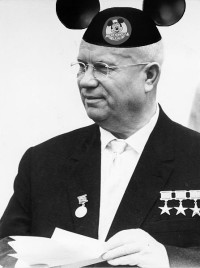As some of you know, I study and teach two subjects in depth: the history of broadcasting and the history of the USA National Security State. These two topics merge when the objects of government wiretaps realize that they are being listened to, then make strategic comments or even entertain their eavesdroppers. At this point these individuals become partially willing hosts of a radio show, the government serving as both their producers and their audience. Various books offer famous moments of this phenomenon from the 1940s and 1950s.

Let’s begin with examples mentioned by Curt Gentry in his classic tome J. Edgar Hoover: The Man and the Secrets. One of the Federal Bureau of Investigation director’s most popular surveillance subjects was the Australian born labor leader Harry Bridges. Hoover spared no effort or expense in his unsuccessful bid to prove that Bridges was a communist, thus deserving of deportation. So followed, tracked, and bugged was the San Francisco based longshoreman that he became an expert on when the government was listening in on him. At that point Bridges would concoct elaborate fantasies designed to fascinate his watcher/listeners.
“We’d talk all sorts of silly stuff,” Bridges later recalled, “about how we were planning, for instance, to take over the Gimbel [department store] strike so we could use the pretty Gimbel shopgirls to help me take over the New York longshoremen.” In some instances when Bridges stayed at hotels, he would listen for FBI agents in adjacent rooms to begin typing his comments as he spoke. This would inspire him to concoct ever more nonsensical tales to keep the program, so to speak, going.
Then there were the various left wing men who, in the 1930s and 1940s, orbited around one of J. Edgar Hoover’s least favorite individuals: first lady Eleanor Roosevelt. Hoover had convinced himself that Mrs. Roosevelt favored these individuals, many of them labor and civil rights leaders, because she was having sex with them. Thus they became targets for surveillance, among these National Maritime Union leader Joseph Curran and his lieutenant, Frederick “Blackie” Meyers. Like Harry Bridges, both unionists became old hands at noticing their surveillance. At that point, anxious to mock Hoover’s delusions, they would shout licentious nonsense at each other such as “Goddamn it, Blackie! I’ve made enough sacrifices. Next time you service the old b . . . !”

Finally, we come to Soviet Premier Nikita Khrushchev, who visited the United States in 1959 and became outraged when, for security reasons, he was denied an opportunity to tour Disneyland. In response to this cautionary declaration from the mayor of Los Angeles, he staged a faux temper tantrum in his suite at the Ambassador Hotel. It is all chronicled in Peter Carlson’s remarkable history titled K Blows Top: A Cold War Interlude.
“How dare this man attack the guest of the president [Eisenhower] like that!” Khrushchev bellowed in his shirt sleeves. Carlson continues:
“The premier seemed so enraged that [Soviet Foreign Minister] Andrei Gromyko’s wife, Lidia, hustled off to get him a tranquilizer. But it was all an act. Khrushchev was putting on a performance for the benefit of the Americans he assumed were listening to him via bugs hidden in the ceiling.
“At times his voice rose to a scream. His fury seemed to have no limits. Only his eyes, which sparkled with mischief, gave him away,” [his son] Sergei recalled. “Now and again, father raised a finger and pointed to the ceiling, as if to say, ‘This isn’t for you; it’s for those listening in’.”
Khrushchev himself wrote this strange performance up in his memoirs:
“I was in full control. I was giving vent to my indignation for the ears of the Americans accompanying us. I was sure that there were eavesdropping devices in our room and that Mr. [Henry Cabot] Lodge, who was staying at the same hotel, was sitting in front of a speaker with an interpreter and listening to our whole conversation. So, for his benefit, I ranted on about how I wouldn’t tolerate being treated like this.”
In these remarkable moments, subjects became subjectors: insisting that their auditors consider their agenda, rather than just the surveillance states. The monitored became performers, playing to the delusions of a panopticon turned into an audience. And if we define radio as audio streamed to an audience, the wiretapped became radio stars. This happened a lot in the mid-twentieth century. Its significance has yet to be fully assessed.


